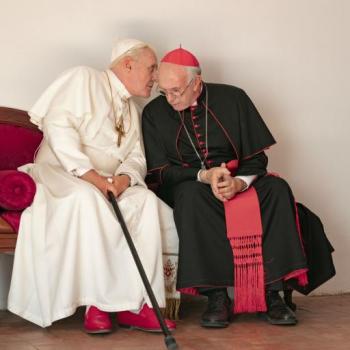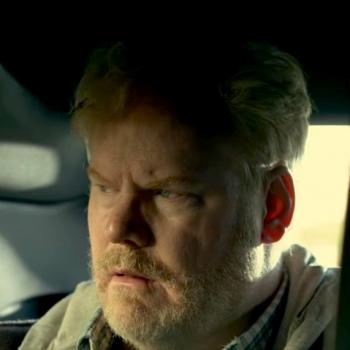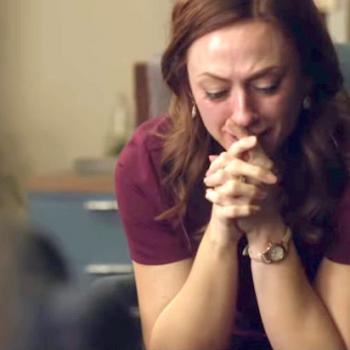Sr. Rose Pacatte has a terrific and inspiring interview with Martin Sheen, tied to his new movie “The Way,” over at National Catholic Reporter. He talks about his faith, his family, his film career, and much more.
I feel that your opening performance in “Apocalypse Now” (1979) has something to do with your new film, “The Way,” because, to me, that performance reveals the sacramentality of film because it outwardly manifests the inner reality of a man’s darkness and despair. Thoughts?
I was 36 years old and I was an alcoholic at that time. That sequence was in large part a reflection of my own personal brokenness. I was not a practicing Catholic at the time, and I had no clue as to what I was getting into with the film. I was called in to replace someone [Harvey Keitel] and I came into a volatile situation in the spring of 1976. Six weeks after I arrived [in the Philippines] Typhoon Olga hit and the film was delayed. A year later, I had a heart attack, a really close call.
In film, if something is impersonal, no one cares. Things that last are things that cost people and the actors that portray them. I had an instinct that I could endure this role if I could be honest. I was playing a frightened, confused professional killer [Capt. Benjamin Willard], an unstable frightened alcoholic. I didn’t have a clue who this character was supposed to be and the director [Francis Ford Coppola] said to me: “It’s you. Whoever wants to arrive at any kind of certainty as an actor brings themselves.” I realized I could wrestle this demon. There’s an old saying that an artist gets a license to play this part. I used the license to go to a place that was both cathartic and terrifying. My poor wife, Janet, got a glimpse of this poor devil in that sequence, the anger, fear, resentment, disappointment that had built up over 36 years. It was filmed on my 36th birthday, you know.
What came next for you spiritually?
“Apocalypse Now” began a journey for me that culminated in Paris in 1981. This is when I was able to bring it all together — my life, my family, my career, my brokenness. I was doing this little film in Paris and the family couldn’t come because of school and things. I had time to walk around and reflect on all that had gone down before, and I ran into Terrence Malick. I had known him from the early ’70s, since “Badlands.” At that time he was living under the radar. He is an articulate and spiritual man and he became a kind of spiritual adviser for me. We would talk endlessly when I wasn’t working. We would talk about spirituality and philosophy and the journey. He’s an Episcopalian.
That’s interesting. Because the Catholic News Service review of Malick’s latest film, “The Tree of Life,” says that “Malick’s agnosticism seems to win out.” It sounds like you would not agree with that assessment.
He and his wife Jill Jakes divorced after “Badlands” [1973]. He was broken and went to a church in Paris and met Michelle Morette. They married in 1985 and he brought her to the States but they split up in 1998. Terrence married his childhood sweetheart, Alexandra “Ecky” Wallace, that same year in Texas. Ecky attended seminary and I believe she is ordained. Today they attend an Episcopal church. Malick went to St. Stephen’s, an Episcopal boarding school, in Austin, Texas, and he’s very connected to that school.
At any rate, Malick became a kind of life coach for me. He became a great anchor for me. The last book he gave me to read, and he had me read several times, was The Brothers Karamazov and it transformed my spirit. When I finished reading it I put it down and literally got up and walked to St. Joseph Church [the English-speaking parish in Paris]. It was May Day and I banged on the door and this Irish Redemptorist priest opened the door and said, “What’s going on?” I told him, “I have been away from the church for a long time and I’d like to go to confession.”
Then what?
I had dropped in at St. Joseph’s occasionally while in Paris, so I was not unfamiliar. And I was fascinated by the new Mass. I had been aware of changes but was not practicing for a long time. I hadn’t wanted to rejoin the church and come back to a sense of fear and condemnation that I had absorbed growing up, that God would strike me down. When I had the heart attack I got the last rites in the hospital. I had a great fear of dying and going to hell. And the thing is, I loved the church as a boy. We were 10 kids in an Irish Catholic family; we went to Holy Trinity Parish in Dayton [Ohio] where the Sisters of Notre Dame taught.
How had the church changed from the time you stopped practicing the faith until your return?
I came back to the church of compassion, love and service, not a church that had me waiting to be condemned for my sins. I found the church of Mother Teresa and Daniel Berrigan. Mother Teresa drove me back to Catholicism and Dan Berrigan keeps me here. I became very active at that time.
What have you learned since that day in 1981?
The last 30 years have been by far the most difficult and the happiest of my life. Life has to cost you; if something of value costs you, then it is of inestimable value.
The thing I learned from the Berrigans is that you are not going to change the world, and maybe not even the person next to you. The only person you can change is you.
What’s the latest step in your spiritual journey?
I love the journey. I am always nervous on airplanes so when I was on a plane I’d bargain with God: Get us a safe landing, and I’ll do this or that. Even when I came back to the church I’d get my rosary out because I was afraid.
Once when I was on a plane leaving Washington, D.C., I was just exhausted. I was the first one on the plane and I fell fast asleep as soon as I took my seat. All of a sudden I was jolted awake. I had no time to get out my rosary, so I told God: Thank you for this life; it’s been wonderful. I could not have asked for anything better. If I don’t make it back, be with those I leave behind. If this is the end of the journey, it’s been wonderful and I am grateful.
Even this horrible time this year with our son [Charlie Sheen], it has made us, my wife and me and our family, pray more fervently. I love Julian of Norwich and St. Therese who said: “Everything is grace.” This is what my life is, through all the anger, everything: grace.
There’s much more. Read it all.











